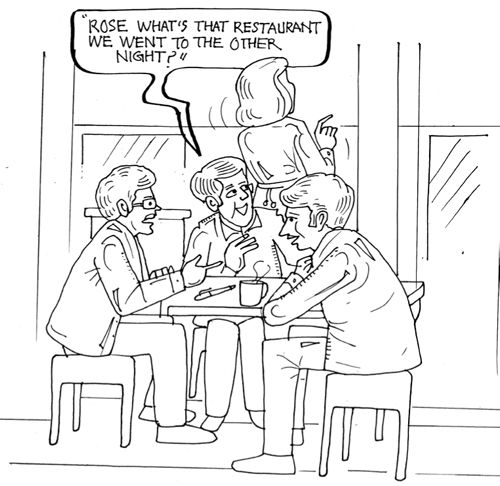How to Memorize Anything (12 page)
Read How to Memorize Anything Online
Authors: Aditi Singhal,Sudhir Singhal
Tags: #Self-Help, #Meditations

After you have associated all your things-to-do for the day, all you have to do is complete one task and that will remind you of the next, and so on.
You will learn how to remember this list with time details as well when we learn to remember appointments using the number pegging system in chapter 12 ‘
Peg System
’.
MEMORIZING A CHECKLIST
On the second day of my 3-day long Mind and Memory Workshop for students organized in a college, a participant shared his experience of using the chain method in his personal life. I had taught them the chain method on the first day of the workshop. He told me that his apartment was on the sixth floor and most of the time while leaving for college he would feel as if he was forgetting to pick up something. Because of this, he would check again to make sure he had taken everything he needed so that he didn’t have to come up again. But by the time he would reach the ground floor, he would find that he had actually forgotten something important at home. Sometimes it was his mobile phone or bike keys or sometimes his important notes. This would lead to a lot of wastage of time and energy.
But after learning the chain technique of memorizing, he learnt to apply it successfully to memorize all the things without missing anything.
Here is the list that he shared with the other participants at the workshop:
- Wallet
- Identity card
- Watch
- Mobile
- Sunglasses
- Water bottle
- Books
- Handkerchief
- Keys
Now let’s try to make a chain for the above list.
Just imagine it’s your birthday and your mother gives you a brown leather
wallet
as gift. You put some cash in it and try to insert your
I-card.
But the card is too big. So you tie this card to your
watch
with a string and wear the watch. Your watch turns into a
mobile
that starts ringing loudly. It’s your sister who calls to wish you and tells you that she has bought big, black
sunglasses
as your birthday gift…
Now complete this chain using your own imagination.
Similarly you can also practice memorizing the following given checklist of things to be taken by a student to a folder-making competition. The list is:
- Handmade paper
- Broken CD pieces
- Quilling strips
- Glue
- Silver string
- Quilling tool
- Scissors
- Sketch pens
- Yellow highlighter
- Stapler
- Ruler
- Pencil box containing pencil, rubber, and sharpener
Write your visualization:
Students can use this wonderful technique to memorize key points of their answers for faster recollection during exams. For more details and examples, you can check the students section where a combination of two or more techniques has been used to memorize long answers, vocabulary words, formulae, periodic table, scientific terms, and other relevant information.
The chain method is probably the most basic memory technique, and is very easy to understand and use.
However, its reliability depends on the user remembering the sequence of images or events in a story. It is obvious that if an image is missing from the sequence, or if an element is forgotten, some or all following images may be lost as well. If the visualization is clear and vivid, chances are that a person will definitely recall everything memorized through this method with cent percent accuracy.
C
HAPTER AT A GLANCE
- The
Chain Method
is a quick way to connect unrelated items on any given list. - It is the most basic memory technique which is very easy to use and understand.
- It includes creating effective links between pairs of items to enable easy recall.
- We can create a chain of words in two ways:
- By linking each word with the next.
- By weaving a story around the items to make the learning more interesting and permanent.
- By linking each word with the next.
- This method can be used to memorize things like:
- Shopping list
- To-do list
- Checklist
- Points of speech or presentation
- Points to be discussed in a meeting etc.
- Key points in answers to important questions
- Shopping list
6
PERSONAL NICK NAME (PNN) METHOD
A few old couples would get together occasionally to talk about life and have a good time. One day one of the men, Rohit, started talking about this fantastic restaurant he had been to the other night with his wife: ‘Really?’, one of the men asked, ‘what’s it called?’
After thinking for a few seconds, Rohit said, ‘What are those good smelling flowers called again?’
‘Do you mean a rose? the first man questioned.
‘Yes that’s it,’ he exclaimed. Looking over at his wife he said, ‘Rose, what’s that restaurant we went to the other night?’

T
ill now we have tried to memorize a list of words that we are familiar with, therefore we could create a mental picture of them the moment we heard them. But what if we need to memorize difficult, unfamiliar words or names of new places or people about whom we don’t have any image in our mind? For instance, words like Ukraine, helium, exorbitant, etc. For that we have to learn a new method called the
Personal Nick Name Method.
PNN (PERSONAL NICK NAME) METHOD
When we hear a difficult or long name of a person, we usually give it a short (nick) name so that it becomes easy to pronounce. In the same way, when we come across any new or difficult word, we should pronounce it slowly, so as to find a familiar word similar to its pronunciation or a related image already stored in our personal memory. We can use that word as a nickname for the new word. This method of giving a nickname to a new word is known as
Personal Nick Name (PNN) method
. It is called ‘personal’ as nicknames may vary from person to person. Nickname can be one word or a group of words.
N
ICK
N
AME
I
T
!
Suppose you need to visualize a country name, like
Poland
. At first, it will be difficult for you to visualize this word in your mind if you have never been there. But through the PNN system, when we pronounce Poland slowly as
PO –L – AND
, some familiar words we can find in it are:
- ‘Pole’or
- ‘Pole on Land’ or
- ‘Pole + Ant’ or
- ‘Polar Bear’ or
- ‘Polo’ (mint)
Some other words may come to your mind depending upon your imagination. Different people may think of different nicknames in a word, that’s why it is known as the
personal
nick name method, as it not fixed and depends on one’s imagination and earlier vocabulary.
Now a word like Poland, which was earlier difficult for you to visualize, is a clear image for you.
This PNN method is useful for memorizing difficult, abstract words, technical terms, scientific terminology, general facts and information, names of people and places, etc. But before learning to memorize these, lets first see some examples to understand how to break up abstract words or names into familiar words and images.
Some examples are:
| | Abstract Words | Personal Nick Name | Image (funny) |
|---|---|---|---|
| 1. | Honesty | Ho – nest – y | Nest |
| 2. | Diligent | Dell + agent (Computer Brand) | Agent is selling Dell Computer |
| 3. | Vijaywada | Vijay + Wada (Name of Person) (South Indian dish) | Vijay is eating Wada |
| 4. | Rajendra Prasad | Raja + Prasad | Raja is distributing Prasad |
| 5. | Ukraine | U (you) + Crane | You are lifting a crane |
| 6. | Slovakia (country) | Slow + walk (vakia) | A person is walking very slowly |
| 7. | Helium (element) | Heel + yumm | A man is eating the high heel of a sandal and saying ‘Yummm…’  |
| 8. | Exorbitant | Ex – orbit – ant (out) | An ant is moving out of its orbit around the Earth |
| 9. | Cosmic Rays | Cosmetics + rays | Cosmetics are coming out in the form of rays . |
| 10. | Chromite | Crow + mite | A mighty crow |
It is not always necessary to make PNN according to a similar sound of the given word. Infact, any
other knowledge or related image can serve as a nick name
for that word. Let’s take ‘
Australia
’—when you pronounce it slowly as
Aus – tra – lia
, it sounds like
Os – tri – ch
(Ostrich) or it may sound like
Ash – tray
. But on hearing Australia, if someone is reminded of ‘
Kangaroo’
, then he/she can take
Kangaroo
as the nick name for
Australia.
Similarly,
‘Agra’
reminds me of the famous
‘Taj – Mahal’
or the
‘Congress’
(political party of India) reminds me of
‘Sonia Gandhi’
. So, we can take these as the PNN of the respective words.
Some more such examples:
| Words | Related image/Knowledge | Image to visualize |
|---|---|---|
| Switzerland | Switzerland is famous for watches | Designer watches |
| Gujarat | Dandia dance is famous in Gujarat | People dancing in dandia dress |
| Amritsar | Golden Temple | Golden temple |
| Srilanka | Ravan (from Ramayana) | Ravan |
| Beauty | Aishwarya Rai | Aishwarya Rai |
| Africa | Forests | Forests |
